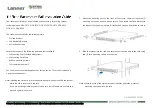
100
C
HAPTER
10: U
SING
A
UTOMATIC
IP C
ONFIGURATION
How Your Switch
Obtains IP
Information
Your Switch has two ways to obtain its IP address information:
■
Automatic IP Configuration
(default) — the Switch attempts to
configure itself by communicating with address allocation servers on
the network or by selecting from a pool of addresses. These servers
use industry standard methods to allocate the Switch IP configuration:
■
Dynamic Host Configuration Protocol (DHCP)
■
Auto-IP — this feature generates a random IP address within the
range 169.254.1.0 to 169.254.254.255 and compares it to
addresses already used in the local broadcast domain.
■
Bootstrap Protocol (BOOTP)
For ease of use, you do not have to choose between these three
automatic configuration methods. The Switch tries each method in a
specified order.
■
Manual IP Configuration
— you can manually input the IP
information (IP address, subnet mask, and default gateway).
If you select an option for no IP configuration the Switch will not be
accessible from a remote management workstation on the LAN. In
addition, the Switch will not be able to respond to SNMP requests.
How Automatic IP
Configuration
Works
When your Switch is powered up for the first time the IP configuration
setting is set to
automatic
— this is the default setting.
If your Switch has been powered up before, whichever of the three
options for IP configuration (
manual, automatic, none
) was last
configured is activated when the Switch powers up again.
You can switch to manual IP configuration at any time using a serial port
connection to set up the IP information. For more information see the
Getting Started Guide that accompanies your Switch.
Summary of Contents for 3C17203 - SuperStack 3 Switch 4400
Page 8: ...GLOSSARY INDEX ...
Page 14: ...14 ...
Page 26: ...26 CHAPTER 1 SWITCH FEATURES OVERVIEW ...
Page 44: ...44 CHAPTER 3 USING MULTICAST FILTERING ...
Page 55: ...How STP Works 55 Figure 13 STP configurations ...
Page 58: ...58 CHAPTER 4 USING RESILIENCE FEATURES ...
Page 84: ...84 CHAPTER 7 STATUS MONITORING AND STATISTICS ...
Page 92: ...92 CHAPTER 8 SETTING UP VIRTUAL LANS ...
Page 98: ...98 CHAPTER 9 USING WEBCACHE SUPPORT ...
Page 120: ...120 CHAPTER 12 POWER MANAGEMENT AND CONTROL ...
Page 122: ...122 ...
Page 126: ...126 APPENDIX A CONFIGURATION RULES ...
Page 134: ...134 APPENDIX B NETWORK CONFIGURATION EXAMPLES ...
Page 150: ...150 GLOSSARY ...
















































